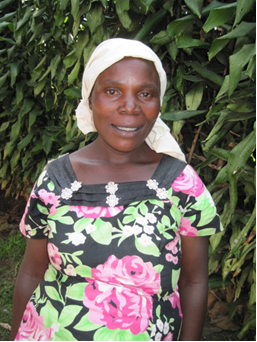Now expecting her seventh child, Ms. Mwanya has benefited from the efforts of DRC-IHP, which launched a behavior change communication campaign to encourage women to seek early care and provided SP to health centers in the project’s target areas.

Honorine Mwanya, expecting her seventh child, has received medication to protect her and her baby against the complications of malaria. Source: Landry-Serges Malaba
In the Democratic Republic of Congo (DRC), malaria remains a major health problem, and pregnant women are among those most critically affected. During the early stages of pregnancy, malaria can disrupt the normal growth of the baby and cause maternal anemia; it can later lead to premature delivery, low birthweight, and increased risk of infant death.
With support from the President’s Malaria Initiative (PMI), the DRC-Integrated Health Project (DRC-IHP) is helping to protect expectant mothers and their babies by offering intermittent preventive treatment (IPTp). This approach provides pregnant women with two doses of an antimalarial medication containing sulfadoxine-pyrimethamine (SP), which prevents the negative effects associated with malaria infection. Only one in five pregnant women in the DRC currently receive the recommended two doses of SP.
To be effective, SP must be delivered starting in the second trimester of the pregnancy. In the health zone of Katana, like many rural areas in the DRC, early prenatal care is not a common practice among pregnant women. Many women see a doctor for the first time toward the end of their pregnancy, while others will not see one before the delivery itself. This had been the case for Honorine Mwanya, 40, a mother of six.
Now expecting her seventh child, Ms. Mwanya has benefited from the efforts of DRC-IHP, which launched a behavior change communication campaign to encourage women to seek early care and provided SP to health centers in the project’s target areas.
“I went to the antenatal clinic for the first time after giving birth six times”, said Ms. Mwanya. “I had never been before and my children’s health had been troubled. But this time, through a community health worker, I received advice on taking medication against malaria. I know now that I was ignorant of the consequences that malaria may bring.” She is now encouraging other pregnant women to see a doctor early during their pregnancy to protect themselves and their unborn children.
